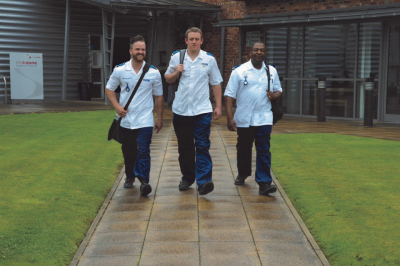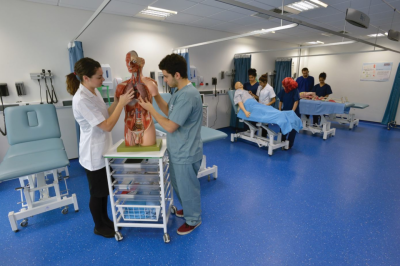
University of Bolton, Deane Road, Bolton. BL3 5AB
Tel:
Email:


“At the University of Bolton, we take great pride in providing a quality, supportive learning environment for our students.”
Professor George E Holmes DL | President & Vice Chancellor
“...tutors are very supportive and you’re not just a student ID number, at this university you are an individual with a name.”
Ellisse Vernon | BSc (Hons) Adult Nursing
Back to menu
Back to menu
Study with an Off-Campus Partner
Back to menu
Back to menu
University of Bolton, why we are the right choice
Location - Bolton, Greater Manchester

02/12/2022
Nursing|FdSc Nursing Associate
The nursing profession has an extraordinarily long and distinguished history, dating all the way back to the Roman Empire in 300AD. Nurses provide essential care to patients in various healthcare settings, from hospitals to clinics, and are responsible for the health and well-being of their patients.
Modern nursing is a highly demanding and challenging profession, and nurses must be accountable for their care. Several vital principles underpin this in nursing practice; treating everyone with dignity and respect, taking responsibility for the care they provide, promoting health and preventing ill health, and providing care that is safe and of the highest quality.
If you’re considering studying a nursing degree at the University of Bolton, you’ll learn to apply the following principles as you work towards a career as a confident and professional nursing associate...

Nurses are accountable professionals
All professionals in any walk of life are accountable for their work, but in nursing, this accountability means more than just being able to justify your actions. It means being open and honest about mistakes, taking responsibility for your professional development, and being answerable to patients, their families, and carers.
Nurses must adhere to a strict code of conduct and ethical guidelines and be able to justify their actions if they are called into question. After all, impeccable nursing practice could be the difference when it comes to a patient's health and life expectancy.
Treating everyone with dignity and humanity
Patient dignity is the principle at the heart of the nursing practice. Nurses must treat all patients with respect, compassion, and understanding, regardless of their background or circumstances.
It is important to remember that patients and those around them have different wants and needs and should be treated accordingly. To give essential care means getting to know your patients, their families and carers and understanding their needs and preferences so that you can take them into account, and make them feel secure in your hands.
It also means considering a person's cultural and religious beliefs and social circumstances. Applying the correct circumstantial considerations is crucial when providing end-of-life care.
Nurses must take responsibility for the care they provide
The responsible care principle is about more than just providing high-quality care. It also includes ensuring that care is coordinated and integrated across all healthcare professionals involved in a patient's care.
Maintaining a high standard can be a challenge, particularly in large organisations, but it is essential to ensure that everyone involved in a patient's care is working towards the same goal.

Promoting health and preventing ill health
The promotion of wellness and the prevention of ill health are key principles of nursing practice. Nurses must promote good health and well-being while preventing disease and illness.
This may include educating patients about healthy lifestyle choices, such as eating a balanced diet and exercising regularly, as well as helping them to quit smoking and stay alcohol-free.
Providing care that is safe and of the highest quality
Safety is paramount in healthcare, and nurses must ensure that their attitude towards it is beyond reproach for patients and staff. Including adhering to infection control procedures, using personal protective equipment correctly and reporting any incidents or near misses.
Nurses must be vigilant in checking that the medication they provide is safe and of the correct dosage. Medication administration mistakes are among the most common mistakes in healthcare, so care must always be taken when handling and administering drugs.
It is also vital to ensure that any equipment used in care delivery is clean and fit for purpose. Including the safe disposal of needles or surgical equipment and that any reusable equipment is sterilised and cleaned correctly.
Managing day-to-day risks
Risk management is another integral part of nursing practice. Nurses must identify potential risks to patients and staff and put measures in place to minimise these risks.
Assessing risks is vital, such as identifying fall risks and applying preventative measures such as bed rails and handrails in place if required. It also means having systems and procedures in place to deal with incidents should they occur.
Having up-to-date knowledge and skills
To provide the best possible care, nurses must stay up-to-date; keeping abreast of new developments in healthcare and participating in continuing professional development activities.

The Principle of Teamwork
Working as part of a team is essential in healthcare. Nurses must effectively communicate with other team members, including doctors, pharmacists, and therapists, to ensure that care is coordinated and cohesive. Communicating effectively with patients, and their families is also essential. Effective communication includes sharing information accurately and using language that everyone can understand.
It is also important to work well under pressure and delegate tasks appropriately. Good teamwork means being able to support and motivate each other, as well as being able to resolve any conflict that may arise.
Improving safety and quality of care for everyone
Patient safety is a top priority in healthcare, and nurses have a vital role in ensuring that care is safe for all.
While these principles may seem common sense to most, nurses know that they underpin proper practice and make nursing a worthwhile profession with the maximum scope for job satisfaction.
Nursing is a vocation, and if you want to become a qualified nurse, it's best to study at an accredited institution that offers an FdSc Nursing Associate degree.
The University of Bolton offers a level five degree programme in this area which provides student nurses with the knowledge and skills necessary to become an effective and essential part of any nursing team.
More information about the course can be found here.